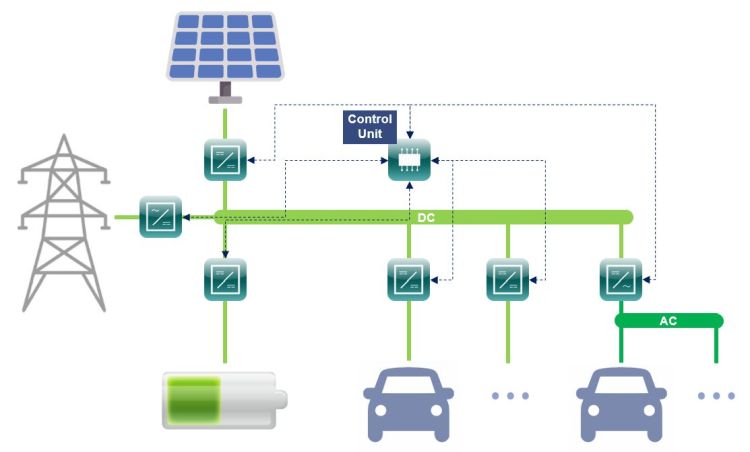The considerably increasing number of electric vehicles also causes the importance of the charging infrastructure and grid security concepts to increase. Charging electric cars after the start or end of work will cause load peaks in the power grid. Such peaks could be avoided, if the complete period of the car’s inactivity would be used for charging. According to a study on behalf of the Federal Ministry of Transport, mean operation time of cars is 45 minutes per day only. Within the SKALE project, Karlsruhe Institute of Technology (KIT), together with Robert Bosch GmbH and Power Innovation Stromversorgungstechnik GmbH, develop a scalable charging system with a photovoltaic facility, a stationary lithium-ion storage system, and a medium-voltage grid connection.
The SKALE project combines electric mobility and stationary battery storage systems in a direct voltage grid infrastructure for semipublic and private spaces. Smart charge management, use of decentralized renewable energy producers, and stationary battery storage systems will prevent load peaks and enhance grid stability. The research project will cover the entire energy flow chain and seeks to enhance charging capacity and efficiency while reducing costs. All requirements, from energy supply by the grid to need-tailored interim storage, distribution, and conversion to the vehicle battery and feeding the energy back into the grid will be considered. “The new approach will result in a viable infrastructure solution for any parking areas with numerous charging stations. And decentralized energy sources will be integrated efficiently,” says Professor Marc Hiller from KIT’s Institute of Electrical Engineering (ETI).
Local Flexibility and High Efficiency
Currently, electric vehicles can be charged with alternating or direct current. When the vehicle is charged with alternating current, conversion into direct current in the vehicle reduces charging capacity and efficiency. When electric vehicles are charged with direct current, charging electronics is integrated in the charging stations. This way, charging capacity and efficiency are increased, as are infrastructure costs. “The problem consists in the fact that both charging concepts concentrate on either the vehicle or a part of the infrastructure, but not on the complete energy flow chain,” says Nina Munzke, Group Head at ETI. Contrary to conventional charging processes, it is now planned to partly centralize power electronics on the grid side, to use a buffer storage system, to centralize load flows, and to distribute energy in a direct voltage grid. This is expected to result in cost reductions, high scalability, flexible locations, and a high efficiency.
Within the framework of SKALE, a charging infrastructure demonstrator will be designed. The planned setup will include about ten charging stations, a photovoltaic system of about 100 kilowatt peak power, and a battery storage system with a capacity of about 50 kilowatt hours. With this demonstrator, first practical experience will be gained with respect to the setup and operation of charging infrastructure. The measurement data obtained will be used to optimize the energy system and incorporated in future plants.
Stable and Secure Operation

Concept of the scalable charging system: Connection to the medium voltage grid and connection of various charging stations, a photovoltaic facility, and a stationary lithium-ion storage system via a DC grid. (Graphics: Starosta, KIT)
Charging stations, energy storage systems, decentralized energy producers, and grid connections: SKALE will focus on stable and secure operation of the DC grid. A suitable converter concept will also be developed for connection to the medium-voltage grid. High efficiency, compact design, and economic attractiveness shall be ensured. Based on the concept, ETI will set up a laboratory demonstrator scaled in terms of power and voltage to obtain findings with respect to operations management and compliance with grid requirements.
Following simulations, KIT researchers will recommend a design for the overall system and develop a tool to design and optimize the charging infrastructure and its components for a specific location. Using the measurement data from the demonstrator, efficiency of the overall system will be evaluated, including efficient use of renewable energy sources.
The SKALE research project is funded by the Federal Ministry for Economic Affairs and Energy with about EUR 4.3 million. It started at the beginning of this year.
More information on the Battery Technology Center: https://www.batterietechnikum.kit.edu/english/index.php
In close partnership with society, KIT develops solutions for urgent challenges – from climate change, energy transition and sustainable use of natural resources to artificial intelligence, sovereignty and an aging population. As The University in the Helmholtz Association, KIT unites scientific excellence from insight to application-driven research under one roof – and is thus in a unique position to drive this transformation. As a University of Excellence, KIT offers its more than 10,000 employees and 22,800 students outstanding opportunities to shape a sustainable and resilient future. KIT – Science for Impact.

